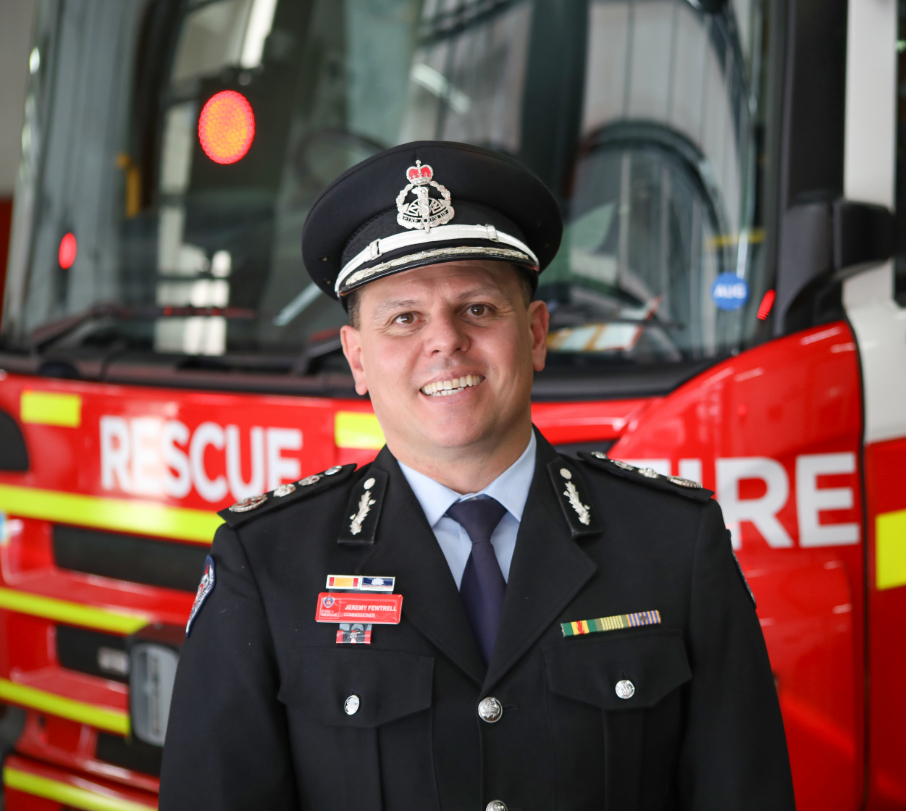Every four minutes, a Fire and Rescue NSW (FRNSW) crew responds to an emergency in one of our state’s towns or cities. A fire, motor vehicle accident or chemical spill, even flooding or an act of terrorism – the stakes are usually high and the conditions often dangerous.
On the night of 10 October 1998, officer 7688 with C Platoon at Burwood station in Sydney – one Jeremy Fewtrell – was part of a six-person crew called to a boarding house fire in Ashfield. He had barely seven months’ operational experience and will never forget what greeted him.
“It was a scene of absolute terror and horror,” says the newly appointed FRNSW Commissioner, reflecting on his time as a rookie fire-fighter. “The 50 or 60 residents were streaming out of any exit they could find; people were jumping out of windows and off the first-level awning to make good their escape. Thick, black smoke was pouring out of the windows.
“The crew from Ashfield had arrived just before us and I saw one of the most incredible feats of fire-fighting – two relatively small fire-fighters bringing down a very large unconscious gentleman on a ladder. Our crew then entered the building to carry out a search and rescue and to help put the fire out.
“It was as big an incident as you can get – the level of life at risk and the time-critical nature of everything that was unfolding before us. We had to do our job and do it perfectly to safely evacuate the occupants trapped inside. It’s one of the jobs I am most proud of.”
Sadly, four people died in the Ashfield blaze, but the death toll could easily have been much higher if not for the heroics of the emergency services personnel. The actions of the Burwood crew earned them a Unit Commendation for Meritorious Service, and Jeremy’s experience, as well as countless others since, have profoundly shaped the accomplished emergency services leader.
Valuable learning
Although he had harboured dreams of becoming a fire-fighter from an early age, Jeremy moved to Armidale from Canberra to study a Bachelor of Natural Resources in 1994 and spent the next four years living at St Albert's College.
“But by the end I was targeting subjects that would be useful to a career in the fire service, and what I learnt continues to be very valuable even today,” he said. “Subjects like soil and water engineering, water and wastewater engineering, and remote-sensing and GIS have all been directly relevant to my operational and management roles.
“With its foundations in science, Natural Resources gave me a good understanding of the chemistry of combustion and the thermodynamics of how a fire behaves. And while our primary focus is dealing with fires in the urban environment, FRNSW is also the combat agency for dealing with hazardous materials spills and incidents, and works very closely with the Environment Protection Authority (EPA).
“My degree positioned me very well to have a good understanding of environmental management, contamination and clean-up issues, and ensured I could speak the same language as the EPA. There are a number of different ways that I have been able to apply the knowledge I gained through my studies at UNE.”
Career trajectory
After 17 years as a frontline fire-fighter, Jeremy served as a station officer and inspector, rising quickly to more senior management positions, most recently as Deputy Commissioner - Field Operations. He oversaw the FRNSW emergency response to the tragic Greta bus crash and played a leading role in the 2019-20 Black Summer bushfires and 2022 floods. (FRNSW provides critical resources and personnel that support the Rural Fire Service and State Emergency Service during bushfires, storms and other extreme weather.)
For four years he has also been on the advisory board for the charity Fortem Australia, which supports the health of first responders, and this week signalled his commitment to make the mental health of FRNSW’s 6,822 full-time firefighters and 4,666 community volunteers one of his highest priorities.
“We have an obligation to look after our people through access to psychologists, wellbeing officers and peer support networks,” Jeremy said. “We also need leaders and managers who are comfortable and able to talk about mental health in a positive way that gives others confidence to put their hand up if they need help.
“I would like to be remembered for making sure FRNSW is well prepared for the challenges of the future and as someone who supported the mental health and wellbeing of our people. This can be a wonderful job and I want people to be able to enjoy a rewarding career, noting that we will at times have to deal with tragic situations. Ideally, I want to see them finish their service and still be in good condition physically and mentally.”
Respect and integrity
With bushfires already blazing across NSW, Jeremy is prepared for a busy bushfire season. But he said he never loses sight of the privilege of being part of one of the state’s oldest public service institutions that prides itself on the values of respect, integrity, service and courage.
“We spend a lot of time trying to prevent fires and other emergencies from occurring and educating the community on how to keep themselves safe,” Jeremy said.
“But when things do go wrong, we are the ones with the technical skills and ability to help them. We are there to talk to them, support them and comfort them, and you get to experience the full range of human emotions.
"It’s a profound role and there is immense satisfaction in the difference you can make. We get the opportunity to do amazing things every day.”


